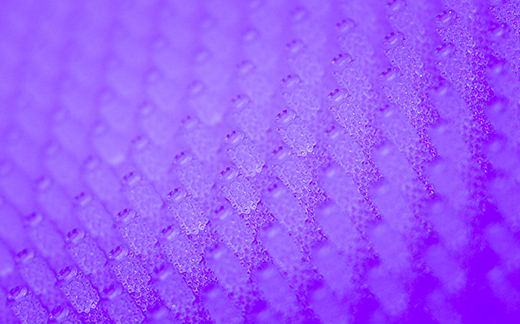University-community partnership eases COVID-19 testing shortage, receives commendation from state of Kansas
Friday, Aug. 7, 2020

Nasopharyngeal swabs for COVID-19 are being 3D-printed at Kansas State University for testing in the region. | Download this photo.
MANHATTAN — The Kansas Department of Health and Environment has recognized Kansas State University faculty and administration and Community HealthCare System for their commitment to work with the Northeast Kansas Healthcare Coalition to successfully fill the supply chain gap of nasopharyngeal swabs for COVID-19 testing in the region.
The group was recognized in a virtual ceremony of commendation with Dr. Lee Norman, secretary of the Kansas Department of Health and Environment, on July 31.
"On behalf of KDHE, I want to thank Dr. Montelone and Dr. Kim for their contributions in helping solve a problem that we had during this pandemic of COVID-19: a short supply of a particular item, the nasal swabs," Norman said. "It really is very illustrative that something kind of minor can really stop the presses. The Northeast Kansas Healthcare Coalition, Community Healthcare System and K-State met this need in a very creative way, which provided these much-needed swabs — not just to KDHE, but to hospitals, clinics, etc."
K-State's Beth Montelone, senior associate vice president for research; Jungkwun Kim, assistant professor of electrical and computer engineering; and Dong Lin, assistant professor of industrial and manufacturing systems engineering, demonstrated their commitment to the institution's land-grant mission and the citizens of Kansas by partnering with Community HealthCare System to produce the 3D-printed swabs.
"Dr. Kim and Dr. Lin are examples of the attitudes of a lot of the faculty here at K-State," Montelone said. "Even though our faculty were all doing their research, analysis and teaching classes remotely, they still felt like they wanted to be part of the effort as well. I am very appreciative of them as exemplars of our faculty."
The partnership began when Todd Willert, chief executive officer of Community HealthCare System, learned that dental offices had been given authorization to make 3D-printed testing swabs. Willert, knowing that major universities typically had the necessary printers, worked with director Michael Bomberger and communications manager Sarah Hancock to make the necessary connections with K-State.
"There were a lot of days when we weren't sure if we were going to be able to perform tests because we were missing that simple little swab — and that's very frustrating as a health care organization," Willert said. "With the ability to produce these 3D swabs, we finally felt that we were doing something proactive and that just made everyone feel so good around here and gave everyone a lot of hope."
Community HealthCare System has hospitals in Onaga and St. Marys, as well as clinics in several other communities. The system also includes two nursing homes and an assisted living facility, making it truly vital that testing supplies are available.
To recognize K-State efforts to solve supply-chain problems, the Northeast Kansas Healthcare Coalition donated a Form 3B 3D printer to Kim's lab.
"My research is centered on 3D microfabrication," Kim said. "So making 3D swabs was not difficult for me, but without this opportunity, I could not join. This is very meaningful and for that, I am really thankful and grateful for everyone who supports these projects."
Kim said the project inspired him to work on his National Science Foundation-funded research project related to an implantable biomedical microdevice.
"I grabbed this opportunity without intention to apply it to my research, but I came to know that these biocompatible resins are available," he said. "So not only is the opportunity amazing but it will also expand my research capability."
To date, K-State has printed and donated almost 2,500 swabs, with another 2,500 additional swabs in process from a single printer. Once swabs are received by Community HealthCare System, they are evaluated, sterilized and packaged. Approximately 600 swabs have been utilized so far at clinics and hospitals in northeast Kansas. Community HealthCare System also shared its swab supply with Nemaha Valley Community Hospital in Seneca and Holton Community Hospital.
"This is just something K-State has done throughout its history — we are the land-grant university for the state of Kansas and it's in our mission to do research and extension for the greater good," Montelone said. "We have been very successful in creative university-industry and university-community organization partnerships and we're all the better for it — the state and the university — so it was a pleasure to be involved with this project."
